The change of intestinal flora causes weight gain after quitting smoking?
- Aspirin: Study Finds Greater Benefits for These Colorectal Cancer Patients
- Cancer Can Occur Without Genetic Mutations?
- Statins Lower Blood Lipids: How Long is a Course?
- Warning: Smartwatch Blood Sugar Measurement Deemed Dangerous
- Mifepristone: A Safe and Effective Abortion Option Amidst Controversy
- Asbestos Detected in Buildings Damaged in Ukraine: Analyzed by Japanese Company
The change of intestinal flora causes weight gain after quitting smoking?
- Red Yeast Rice Scare Grips Japan: Over 114 Hospitalized and 5 Deaths
- Long COVID Brain Fog: Blood-Brain Barrier Damage and Persistent Inflammation
- FDA has mandated a top-level black box warning for all marketed CAR-T therapies
- Can people with high blood pressure eat peanuts?
- What is the difference between dopamine and dobutamine?
- How long can the patient live after heart stent surgery?
The change of intestinal flora causes weight gain after quitting smoking?
“Nature”: The only disadvantage of quitting smoking is finally solved!
Scientists discovered for the first time that in order to counteract the effect of anorexia on the weight of smokers, intestinal bacteria actually promote the absorption of nutrients
Remember the soldier with the green helmet in the WeChat emoji package? He even quit smoking! This full of positive energy is telling us not to smoke, which is not good for our health.
After all, other tobacco companies themselves label their products “The things I sell are harmful to health.” Fortunately, many smokers have thought about quitting for health, but-
Quitting smoking is difficult!
One of the important difficulties lies in quitting smoking and getting fat and getting out of shape. What is causing this?
Recently, the Eran Elinav team of the Weizmann Institute of Science in Israel published important research results in Nature.
They found that the metabolites of intestinal bacteria can help the old smokers who are “anorexia” due to nicotine to increase the absorption of nutrients, but quit smoking This will make the body absorb too much nutrients and become fat [1].
It turns out that smoking can also improve the nutrient utilization of food. It is hardly a low-carbon and environmentally-friendly behavior…
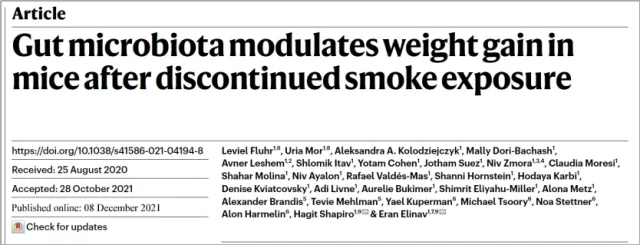 Screenshot of the paper’s homepage
Screenshot of the paper’s homepage
Smoking is harmful to health. Most people with smoking habit hope to quit smoking successfully. However, smoking-cessation-induced weight gain (SCWG) will be accompanied by smoking-cessation-induced weight gain (SCWG).
According to reports, in the process of quitting smoking, the average weight gain is 4.5kg every 6-12 months, and 13% of people gain at least 10kg a year .
Even if calorie intake is restricted, the problem of weight gain caused by smoking cessation still exists. This phenomenon makes Quitting smoking becomes more difficult [2].
Studies have shown that both smoking and smoking cessation can cause changes in the intestinal flora [3-5], is there a causal link between weight gain after quitting and the intestinal flora?
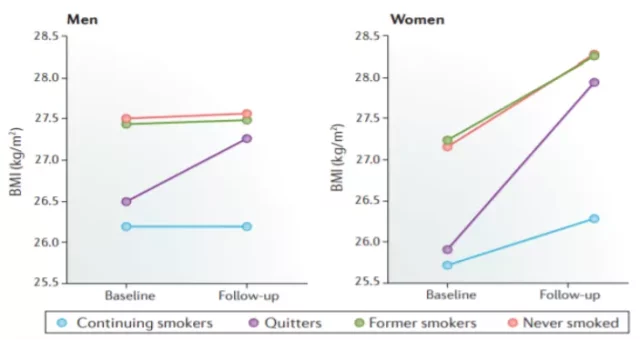 Changes in body mass index after quitting smoking [2]
Changes in body mass index after quitting smoking [2]
In order to answer this question, the Eran Elinav team designed and carried out the following experimental work.
First, the researchers used an automatic cigarette maker to make the mice passively accept smoking, and constructed a smoking mouse model to observe the effect of smoking cessation on the weight of the mice.
The study found that, compared with mice that continued to smoke (continuous SMK group), the weight of mice that quit smoking after 3 weeks of smoking exposure (SMK group) increased significantly over time, and reached the level of weight gain of the non-smoking group (non-SMK group) .
The results of this study are consistent with previous clinical studies that found weight gain after smoking cessation [6].
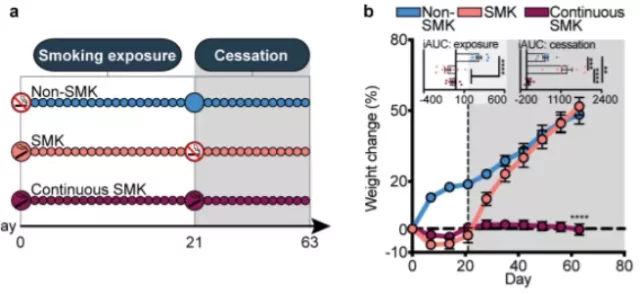 Changes in body weight over time after quitting smoking
Changes in body weight over time after quitting smoking
Since the intestinal flora is closely related to smoking and smoking cessation, the researchers also analyzed the changes in the intestinal flora after smoking and smoking cessation.
Studies have found that smoking exposure for 3 weeks can cause changes in the composition and structure of the intestinal flora .
Metagene function predictions found significant differences in 4 KEGG pathways: cytochrome bc1 complex respiratory unit (M00151); fatty acid biosynthesis (M00083); coenzyme A biosynthesis (M00086); choline-betaine biosynthesis (M00555).
It is worth noting that the intestinal flora of mice after quitting smoking will not completely return to the level before smoking .
Next, in order to determine the role of intestinal flora in the process of weight gain after smoking cessation, the researchers conducted broad-spectrum antibiotic intervention on mice and observed smoking exposure under high-fat diet (HFD) and normal diet (NC) conditions.
And the weight change of the mice after smoking cessation.
The study found that no matter what dietary conditions, pretreatment with broad-spectrum antibiotics can lead to a decrease in the weight growth rate of mice after smoking cessation .
This effect lasts 119 days after smoking cessation. MRI lipid composition analysis also shows that after antibiotic pretreatment The weight gain of the mice became insignificant.
The researchers also analyzed the weight changes of mice exposed to different nicotine concentrations, and the results were consistent, that is, no matter which nicotine concentration was exposed, the weight gain after smoking cessation disappeared after the intervention of broad-spectrum antibiotics. .
In terms of energy absorption, compared with mice without smoking exposure, smoking cessation mice will be higher, which is positively correlated with the change of body weight , while the energy absorption of mice after antibiotic pretreatment is reduced, which is related to the change of body weight Also disappeared.
This shows that the intestinal flora is involved in energy absorption and weight gain after smoking cessation.
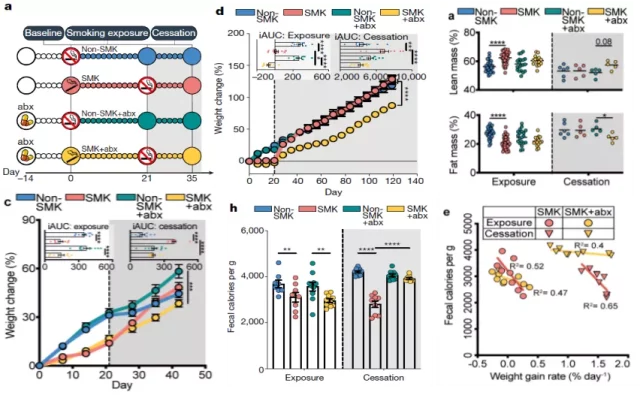 The effect of antibiotic pretreatment on weight change after quitting smoking
The effect of antibiotic pretreatment on weight change after quitting smoking
To further identify the causal link between the intestinal flora and weight gain after smoking cessation, the researchers transplanted the fecal bacteria from the smoking exposure period (day 7 and day 18) and the smoking cessation period (day 24) to sterile mice. Mice (recipient mice are not exposed to smoking), observe the changes in body weight and intestinal flora of the recipient mice under different diet conditions.
Fecal bacteria in transplanted mice exposed to smoking for 7 days will not cause significant changes in the weight of the recipient mice, but fecal bacteria in transplanted smoking exposure for 18 days and smoking cessation period can cause intestinal flora disorder and body weight of recipient mice Growth phenomenon .
Moreover, the transplantation of fecal bacteria during the smoking cessation period can increase the energy absorption of the recipient mice , while the transplantation of the fecal bacteria during the smoking period has no obvious effect on the energy absorption of the recipient.
This shows that the intestinal flora disorder promotes weight gain, especially during the smoking cessation period, this promotion effect is more obvious .
 Fecal bacteria transplantation confirms the role of intestinal flora in SCWG
Fecal bacteria transplantation confirms the role of intestinal flora in SCWG
The researchers then performed metabolomics analysis on the stool and plasma of the mice during the smoking exposure period and the smoking cessation period, and screened out 7 metabolites related to weight gain after smoking cessation, which are N-formyl o-amphene. Formic acid, cucurbitacine octadecine, dimethylglycine (DMG), N-acetylglycine (ACG), methyl hexadecadienoate (16:2n6), 1-palmitoyl-2-γlinoleoyl-GPC ( 16:0/18:3n6) and hexanoylglycine.
Among them, DMG is a derivative of glycine, which is mainly produced by a series of enzymatic reactions of choline in the diet under the action of the intestinal flora, and the concentration increases after smoking exposure . This is consistent with the predicted results of the metagene function of the appeal.
That is, the choline-betaine biosynthetic pathway and key enzymes are up-regulated after smoking exposure.
After choline supplementation, the concentration of betaine and DMG in the plasma and stool of mice will increase, and this phenomenon disappears after antibiotic treatment.
This indicates that the increase in smoking-related DMG levels is related to the precursors produced by the intestinal flora.
The researchers also analyzed the direct impact of intestinal flora metabolites on weight gain after smoking cessation.
Studies have found that DMG supplementation can increase the weight of mice, and this change disappears under antibiotic treatment.
And feeding the mice a choline-deficient diet did not cause weight gain caused by smoking cessation.
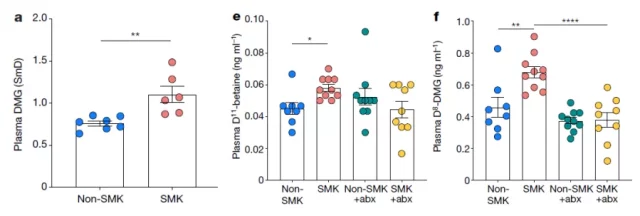 Changes in plasma DMG levels in different groups
Changes in plasma DMG levels in different groups
Another metabolite related to weight gain after smoking cessation is ACG, which is also a derivative of glycine.
It is lower in the plasma of mice during the smoking exposure period and the smoking cessation period. When the antibiotics deplete the intestinal flora, the ACG level will rise to non- Smoking exposure level .
In order to further test the direct effect of ACG on the weight of mice, ACG was added to the diet of mice, and it was found that ACG supplementation can alleviate the weight gain caused by smoking cessation in mice .
The above shows that the intestinal flora metabolites have a direct role in promoting weight gain after smoking cessation.
In order to study the specific mechanism of DMG and ACG-mediated weight gain after smoking cessation, the researchers also performed single-cell transcriptome sequencing analysis on immune cells in the epididymal adipose tissue of mice supplemented with DMG and ACG.
In the case of DMG supplementation, the content of Ly6C+ monocytes in the adipose tissue of mice increased (it has been reported that such cells promote obesity-related inflammation) .
In the case of ACG supplementation, the content of Trem2+ macrophages decreased (previous reports were related to obesity and weight gain) .
Pathways related to obesity, such as immune response, lysosomal function, extracellular matrix, removal of dead cells, angiogenesis, etc., have opposite enrichment in DMG and ACG.
The above shows that the intestinal flora metabolites mediate re-growth, which is related to the regulation of multiple enrichment pathways.
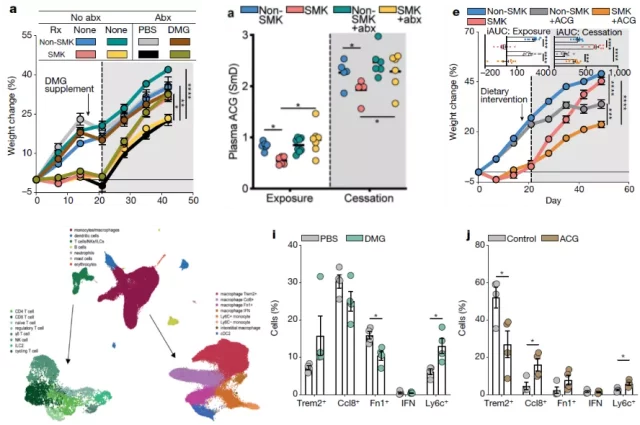
Finally, the researchers also included 96 sex-age-matched volunteers (34 in the smoking group and 62 in the non-smoker group) for a cross-sectional study, and found that the composition of the intestinal flora of the two groups is different, depending on the intestines.
The composition of the tract microflora and the construction of a binary classifier can effectively distinguish between smokers and non-smokers, and the concentration of the intestinal microflora metabolites DMG and its precursor choline and betaine in the smoker group increases , which is similar to animal experiments.
The results in the study are consistent, further verifying the relationship between the intestinal flora and its metabolites in weight gain after smoking cessation.
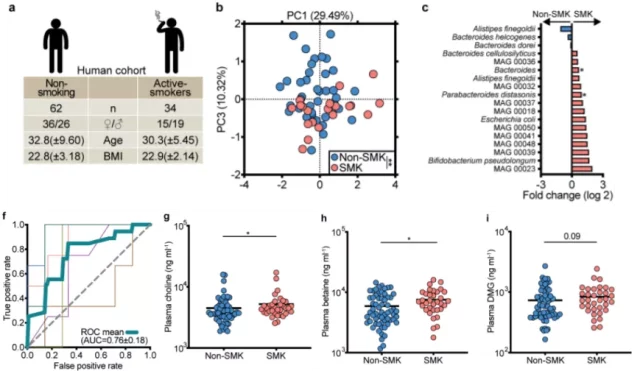 Differences in intestinal flora and metabolites between smokers and non-smokers
Differences in intestinal flora and metabolites between smokers and non-smokers
In general, this study found that smoking is accompanied by changes in intestinal flora disorders and related metabolites- DMG levels increase and ACG levels decrease, which promotes energy absorption during smoking, thereby offsetting the effect of “anorexia” behavior on body weight; In the process of quitting smoking, anorexia behavior can be reduced, but these intestinal flora and related metabolites cannot return to normal levels.
This feedback signal will eventually lead to weight gain after quitting, or it may be possible to improve the success of smoking cessation by intervening in the intestinal flora Rate .
But then again, even if there are various difficulties and obstacles in the process of quitting smoking, the majority of smokers should successfully quit smoking scientifically and reasonably.
To borrow words that were popular on the Internet some time ago, now that emojis have quit smoking, what reason do you have for not quitting?
references:
[1]. Fluhr L, Mor U, Kolodziejczyk AA, et al. Gut microbiota modulates weight gain in mice after discontinued smoke exposure [published online ahead of print, 2021 Dec 8]. Nature. 2021;10.1038/s41586-021-04194-8. doi:10.1038/s41586-021-04194-8
[2]. Harris KK, Zopey M, Friedman TC. Metabolic effects of smoking cessation [published correction appears in Nat Rev Endocrinol. 2016 Nov;12 (11):684]. Nat Rev Endocrinol. 2016;12(5):299-308. doi:10.1038/nrendo.2016.32
[3]. Hankey C, Leslie W. Obesity: is weight gain after smoking cessation an important concern? Nat Rev Endocrinol. 2012;8(11):630-632. doi:10.1038/nrendo.2012.175
[4]. Biedermann L, Brülisauer K, Zeitz J, et al. Smoking cessation alters intestinal microbiota: insights from quantitative investigations on human fecal samples using FISH. Inflamm Bowel Dis. 2014;20(9):1496-1501. doi:10.1097/MIB.0000000000000129
[5]. Lee SH, Yun Y, Kim SJ, et al. Association between Cigarette Smoking Status and Composition of Gut Microbiota: Population-Based Cross-Sectional Study. J Clin Med. 2018;7(9):282. Published 2018 Sep 14. doi:10.3390/jcm7090282
[6]. Bush T, Lovejoy JC, Deprey M, Carpenter KM. The effect of tobacco cessation on weight gain, obesity, and diabetes risk. Obesity (Silver Spring). 2016;24(9):1834-1841. doi:10.1002/oby.21582
The change of intestinal flora causes weight gain after quitting smoking?
(source:internet, reference only)
Disclaimer of medicaltrend.org
Important Note: The information provided is for informational purposes only and should not be considered as medical advice.



